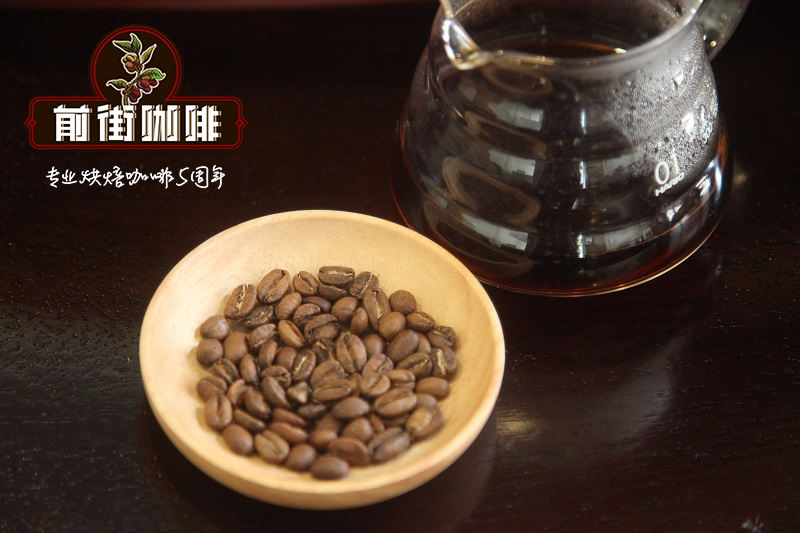Coffee also needs the justice documentary "Black Gold".

Professional coffee knowledge exchange more coffee bean information please follow the coffee workshop (Wechat official account cafe_style)
How much do you think a cup of coffee we drink every day costs?
In fact, a $3 cup of coffee may go into the pockets of coffee farmers for less than 3 cents.
The documentary Black Gold, directed by Nick Francis and Mark Francis, has spent two and a half years shooting since 2003, exploring such an absurd and unreasonable coffee trade.
Coffee = gold?
In 2002, when the global coffee industry was booming, a severe famine broke out in Ethiopia, Africa, where coffee was born. The cause of famine is not natural disasters, but the severe exploitation of coffee farmers under the global free trade system.
The two directors spent more than two years visiting Ethiopia and found Tadesse Meskela, the head of the Auromian Coffee Partnership, a fair trader who is trying to unite farmers and give them reasonable pay. Tadesse's coffee alliance, which has 74000 farmers and produces a variety of top coffee beans, including Yirgacheffee, travels abroad every year in search of foreign buyers willing to pay a reasonable price.
Under Tadesse's leadership, they witnessed how miserable life was in the face of coffee purchase prices, which fell to a 30-year low after the collapse of the International Coffee Federation (ICO) in 1989.
"do you know how much a cup of coffee costs in New York? Tadesse asked the farmers.
(shake head)
"I'm telling you, three dollars is equivalent to about twenty-five dollars, Bill. "
"A kilogram of coffee beans can make 80 cups of coffee. 80 times 25 equals 2000. A kilogram is worth 2000 yuan, Bill! "
"but how much is a kilo of coffee beans on our side? "
"one yuan, Bill. Two yuan at the most. "said the farmers.
The low price of coffee has made Ethiopia, where 15 million people depend on coffee for survival, and coffee accounts for 67% of its export earnings, although it is sitting on a market with an annual output value of US $80 billion, the second largest trading commodity in the world after oil. But it is still one of the poorest countries in the world. Most Ethiopian farmers live on food relief, unable to send immediate-age children to school, and a very poor standard of living. In order to make a living, many farmers have cut down coffee trees and planted Chat, a raw material for psychedelic drugs.
"decoupling the value of coffee from its price is the problem. The price of coffee is determined by the coffee futures markets in New York and London. Top analysts from around the world gathered to calculate the price of this "future commodity". After the price is decided, the middleman can only lower the price from the supplier in order to make a profit. In the end, it is the farmers who are unable to grasp the access and market information. Xu Wenyan, the person in charge of ecological green in Taiwan, said.
Unfair free trade
Despite the worsening problems of poverty and famine, the United States and the European Union, the major consumers of coffee in the world, continue to subsidize domestic food production, dumping or assisting third World countries through free trade organizations such as WTO, cracking down on food agriculture in coffee-producing countries and eroding the international competitiveness of agricultural products in developing countries.
In September 2003, at the fifth ministerial meeting of the WTO in Cancun, Mexico, leaders from across Africa urged rich countries to cancel 300 billion annual subsidies for their agriculture and give African agricultural products room for survival in international markets. According to data, if the African continent's share of world trade increases by 1 per cent, it could generate more than 70 billion yuan a year-five times the amount of aid currently received by the African continent.
"what we need is trade, not foreign aid! "cried an African representative.
However, this demand is still ignored by representatives of Europe and the United States. The WTO meeting finally broke down when developing countries refused to be forced to sign any adverse agreements. WTO, which claims to be "fair competition" and "actively strives to ensure the rights and interests of developing countries," has eventually become a tool for rich countries in the north to make unilateral profits and control the situation of other countries.
The problem of coffee has long gone beyond producers and consumers, sellers and buyers, and has become a complex problem between northern and southern countries, rich and poor countries.
Even more infuriating is the extent to which the US, EU and multinationals are indifferent to the problem. When the "Black Gold" team attended the American boutique Coffee Association trade show in Seattle and tried to visit a number of multinational companies, including Starbucks, they were all turned away. When the film "Black Gold" was shown at the London Film Festival in October 2006, Starbucks and even E-mail told employees across the company that the film's content was "biased and incorrect" and conducted a series of public relations attempts to win public support.
While people in New York, Seattle and Italy sit in coffee shops and enjoy the aroma of coffee, women in Ethiopia have to work eight hours a day for a salary of less than $1. When Starbucks advertised "Your Coffee Break will never be the same! At that time, outside the humble school in Ethiopia, it was painted "Education is the road to the future." When Kraft, Nestl é, Baoqiao, Sarah Li and other multinational companies prosper from the coffee trade, farmers in Yejasuefei are praying to God, "raise the price of coffee!" ".
Fair trade
Injustices in the trading system are unfolding in every corner of Ethiopia. Such a wide-ranging impact is only due to the unreasonable price of coffee.
Tadesse realized the seriousness of the problem. Since 1999, he has tried to jump out of the New York market and find bakers willing to pay reasonable prices, saving about 60 per cent of the price gap by reducing the exploitation of middlemen and giving farmers the profits they should have-a core concept of the Fair Trade movement.
"although it was not until the last three or four years that Taiwan began to talk about fair trade, in fact this movement has a history of 50 years in the world. In addition to providing farmers with reasonable profits, Fairtrade has other principles such as "banning child labour", "promoting gender equality" and "environmental protection". "said Xu Wenyan. KOGREEN Ecological Green, to which he belongs, is the first fair trade franchisor in Taiwan to be officially authorized and certified by the International Fair Trade Organization, mainly selling Fairtrade coffee beans.
Tadesse also tried to use the proceeds of fair trade to open schools in the region, starting with the implementation of education, step by step to help farmers out of poverty.
"providing reasonable remuneration for farmers is only the foundation, and the Fair Trade Movement has even tried to help farmers" get rid of poverty "," build strength "," restore power "and even establish democracy through organizational strength. So as to achieve the whole social transformation process. "said Xu Wenyan.
In addition to providing help to farmers, Tadesse emphasized the influence of consumers in the Fairtrade movement:
"We hope that one day consumers will understand what they drink and make a difference when they develop a sense of consumption. Not only coffee, but all agricultural products are sold at very low prices-and this is the most serious problem affecting all producers. "
Nick and Mark, directors of "Cafe Justice," also said: "by making this film, we hope to force us, as consumers, to question our basic assumptions, such as consumer lifestyle and its interaction with the rest of the world. "
Maybe it's like the concept "Wake up and Smell the Coffee!" conveyed by the film "Black Gold". Only when people begin to approach and understand the stories behind the agricultural products they consume can fair trade generate enough power to change the world.
Professional coffee knowledge exchange more coffee bean information please follow the coffee workshop (Wechat official account cafe_style)
Important Notice :
前街咖啡 FrontStreet Coffee has moved to new addredd:
FrontStreet Coffee Address: 315,Donghua East Road,GuangZhou
Tel:020 38364473
- Prev

Warm South American style, let's start with Colombian coffee.
Professional Coffee knowledge Exchange more information on coffee beans Please follow the coffee workshop (official Wechat account cafe_style) some of the favorite things Colombians talk about, in addition to their once one of the best football in the world, is the coffee culture they are proud of. Drinking coffee in Colombia is a kind of enjoyment, full of street cafes, a steady stream of guests from morning till night, coffee
- Next

Kenyan Coffee and the Movie "out of Africa"
Professional coffee knowledge exchange more coffee bean information Please follow the coffee workshop (Wechat official account cafe_style) Coffee industry all think that Kenyan coffee is one of its favorite products, this is because Kenyan coffee contains every feeling we want from a good cup of coffee. It has a wonderful and satisfying aroma, balanced and delicious acidity and symmetry.
Related
- Can I make coffee a second time in an Italian hand-brewed mocha pot? Why can't coffee be brewed several times like tea leaves?
- Hand-brewed coffee flows with a knife and a tornado. How to brew it? What is the proportion of grinding water and water temperature divided into?
- What is the difference between Indonesian Sumatra Mantinin coffee and gold Mantinin? How to distinguish between real and fake golden Mantelin coffee?
- What does bypass mean in coffee? Why can hand-brewed coffee and water make it better?
- Unexpected! Ruixing Telunsu lattes use a smoothie machine to foam milk?!
- % Arabia's first store in Henan opens into the village?! Netizen: Thought it was P's
- Does an authentic standard mocha coffee recipe use chocolate sauce or powder? Mocha Latte/Dirty Coffee/Salty Mocha Coffee Recipe Share!
- What is the difference between Vietnam egg coffee and Norway egg coffee? Hand-brewed single product coffee filter paper filter cloth filter flat solution!
- What is the difference between sun-cured and honey-treated coffee? What are the differences in the flavor characteristics of sun-honey coffee?
- How to make Italian latte! How much milk does a standard latte use/what should the ratio of coffee to milk be?

